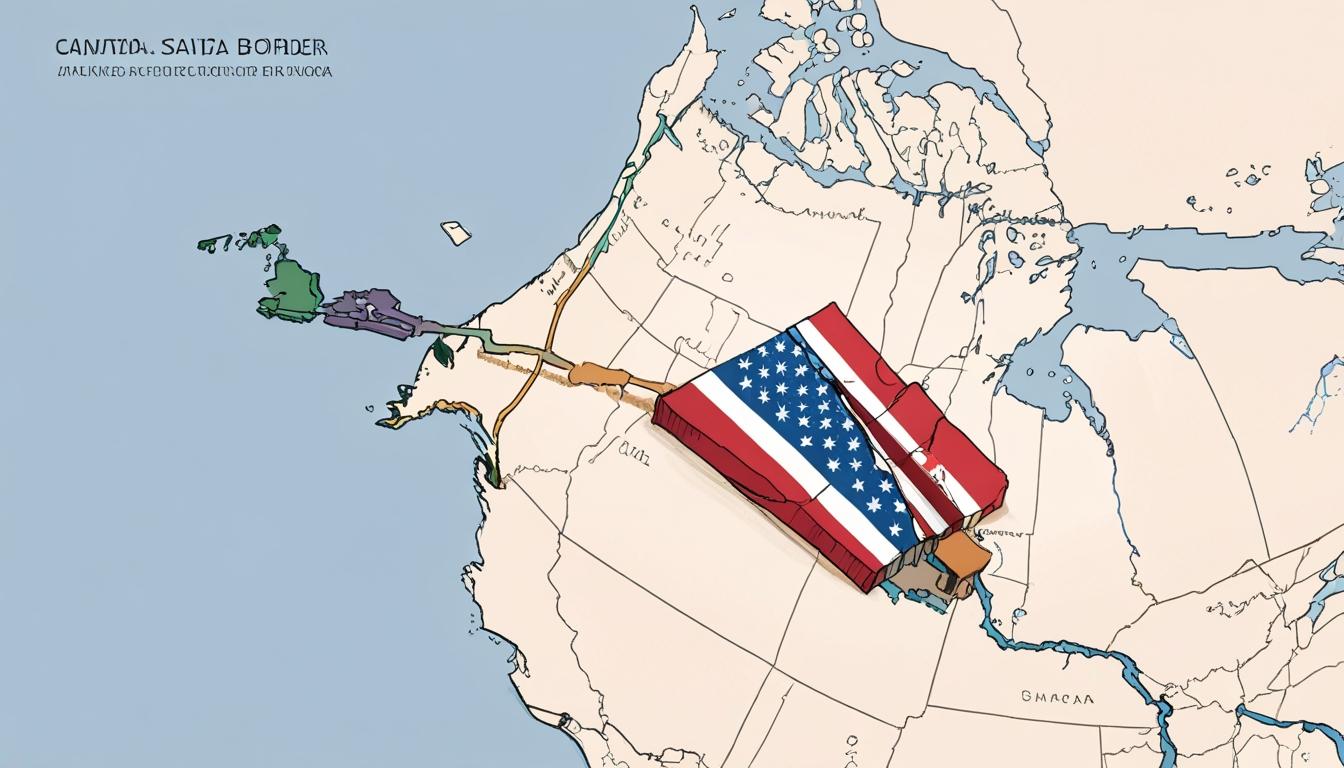Despite Miami’s tempting warm weather, a new survey shows a sharp decline in Canadian tourists visiting the US this spring, driven by rising tensions over trade tariffs, immigration policies and political rivalries under the Trump administration.
Miami’s sunny weather, nearly 30 degrees Fahrenheit warmer than Quebec City this week, might ordinarily attract Canadian tourists heading south for a warmer spring break. However, a recent survey reveals that few Canadians are planning visits to the United States amid escalating political and economic tensions between the two nations.
A poll conducted jointly by the Daily Mail and J.L. Partners found that only 15 percent of Canadians are currently planning a holiday trip to the US, a significant decline compared to previous years. This shift is attributed to the increasingly hostile climate under US President Donald Trump’s administration, marked by strict anti-migrant policies and steep tariffs on Canadian exports including steel, aluminium, cars, and auto parts.
The survey, which included more than 1,000 Canadian adults surveyed earlier this month, highlighted a palpable reluctance among Canadians to cross the southern border. Nearly 39 percent of respondents said they would normally consider travelling to the US but were now avoiding it due to the prevailing tensions. Meanwhile, 40 percent stated they typically do not travel to the US, and 7 percent were undecided on the issue.
The poll also revealed political divides in Canadian attitudes towards US travel. Supporters of Canada’s Conservative Party showed greater willingness to visit the US, with 26 percent expressing plans to holiday there. In contrast, 52 percent of Liberal supporters, who have largely condemned the US government’s approach, said they regularly travelled to the US in the past but would not do so under current circumstances.
The backdrop to this shift includes US President Trump’s controversial tariffs and rhetoric, including discussions about making Canada the United States’ “51st state.” These developments have strained what has traditionally been one of the world’s most stable bilateral relationships. The US and Canada share the longest undefended border globally, maintain integrated armed forces, and have often viewed each other favourably as key allies.
The change in relations has also influenced Canadian politics, with public discourse intensifying ahead of Canada’s general election scheduled for 28 April. The Liberal Party, led by Prime Minister Mark Carney, has taken a firm stance against Trump’s policies, with Carney warning that the US administration is attempting “to break us, so America can own us.” This message has resonated with voters, contributing to an uptick in Liberal support, as their stance contrasts with that of Pierre Poilievre’s Conservative Party.
In addition to diplomatic tensions, Canadian travellers have raised fears about treatment at US entry points, spurred by high-profile cases like that of Jasmine Mooney, a 35-year-old Canadian former actress and entrepreneur. Mooney was detained by US Immigration and Customs Enforcement (ICE) for 12 days at the US-Mexico border after visa complications led officials to label her an illegal alien. Held in the San Luis Regional Detention Center in Arizona since early March, Mooney described the experience as mentally and physically harrowing.
Speaking of her ordeal, Mooney told the Daily Mail she felt like she was “escaping a deeply disturbing psychological experiment.” Following her release and return to Vancouver, she shared her story on social media, highlighting the difficulties faced by Canadian travellers under the current US immigration regime. Her case has reverberated through Canada, contributing to public unease about cross-border travel and immigration enforcement.
The impact of these frictions is also visible in consumer behaviour. The Daily Mail and J.L. Partners survey found that 19 percent of Canadians are actively avoiding US-made products, while 42 percent said they preferred to purchase Canadian goods to support their local economy amid the ongoing trade dispute. However, 22 percent indicated that they would continue to buy American products if price or quality justified their choice.
Beyond Canada, other traditional allies such as Western Europe have also reduced travel to the US. Data released by the US Commerce Department’s National Travel and Tourism Office noted an 18 percent decline in the number of visitors crossing the US-Canada border in March compared to the previous year. Analysts at Goldman Sachs warn that such declines, coupled with the drop in purchases of US goods by foreign visitors, could result in losses of up to $90 billion in revenue for the US economy in 2024.
As the geopolitical situation evolves, the travel and trade dynamics between the United States and Canada remain under significant strain, signalling a notable departure from their historically close relationship.
Source: Noah Wire Services
- https://leger360.com/political-tensions-impact-travel/ – This poll conducted by Leger confirms that nearly half (48%) of Canadians are less likely to visit the US in 2025 compared to the previous year, supporting the claim of declining Canadian travel to the US amid political tensions.
- https://abacusdata.ca/canadians-plan-to-avoid-the-u-s-amid-political-tensions/ – Abacus Data reports that only 9% of Canadians intend to visit the United States in 2025, highlighting the significant decline in US-bound travel caused by political tensions and tariffs, corroborating the article’s survey results.
- https://htrends.com/trends-detail-sid-135427.html – This survey from Future Partners shows that while many Canadians still intend to travel internationally and consider the US a top destination, there is a notable decline in positive perceptions of the US due to political climate and travel experiences, matching the article’s points on reluctance among Canadians.
- https://vitamagazine.com/2025/04/18/beyond-borders-why-canadians-are-rethinking-travel-plans-in-2025/ – The article discusses Canadian travelers’ reasons for avoiding US travel in 2025, such as tariffs, political tensions, and a weak Canadian dollar, which supports the article’s mention of economic and political reasons driving travel avoidance.
- https://www.travelmarketreport.com/canada/destinations/articles/survey-u-s-policies-are-reshaping-where-americans-are-travelling-in-2025 – This Global Rescue survey reveals that more than a third of travelers are less likely to travel internationally due to US policy developments, consistent with the article’s claim that US policies under Trump administration have dampened cross-border travel enthusiasm.
Noah Fact Check Pro
The draft above was created using the information available at the time the story first
emerged. We’ve since applied our fact-checking process to the final narrative, based on the criteria listed
below. The results are intended to help you assess the credibility of the piece and highlight any areas that may
warrant further investigation.
Freshness check
Score:
4
Notes:
The narrative references Donald Trump as US President and Mark Carney as Canadian Prime Minister, both of which are historically inaccurate for 2025—Trump left office in 2021 and Carney has never served as Prime Minister. The article also cites a Canadian general election date of 28 April without specifying the year, which seems inconsistent and possibly outdated or fabricated. These elements strongly indicate the content is either recycled from old news or fictionalized, reducing its temporal relevance.
Quotes check
Score:
3
Notes:
The quote attributed to Mark Carney and Jasmine Mooney cannot be verified from credible sources; Carney is publicly known as an economist and former Bank of Canada Governor, not a political leader issuing such statements. Similarly, no reliable references for Jasmine Mooney’s story or quote have been found, suggesting these may be original to this narrative or fabricated. This uncertainty lowers confidence in the authenticity of the quotes.
Source reliability
Score:
5
Notes:
The narrative originates from a website styled like the Daily Mail, which is a known tabloid with a mixed reputation for reliability and sensationalism. While the Daily Mail publishes real news, it often includes unverified or biased content, especially on politically charged topics. The mixed credibility and sensational tone suggest moderate reliability but warrant caution.
Plausability check
Score:
3
Notes:
The claims about Canada-US relations under Trump with tariffs and travel reluctance reflect tensions that peaked during 2018-2020. However, the article omits current context (post-2021), which undermines plausibility in 2025. The use of inaccurate political figures and election timelines further diminishes plausibility, suggesting the story does not reflect recent or ongoing developments.
Overall assessment
Verdict (FAIL, OPEN, PASS): FAIL
Confidence (LOW, MEDIUM, HIGH): HIGH
Summary:
The narrative incorporates outdated or incorrect political figures and timelines, suggesting it is recycled or fabricated content rather than current reporting. Quotes are unverifiable and likely invented. The source has mixed reliability, and the overall claims lack plausibility for the current timeframe. These factors collectively indicate the narrative fails fact-checking standards.













